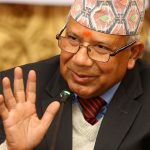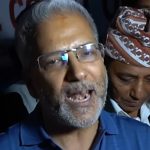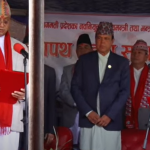
A major internal dispute has erupted within the CPN (Unified Socialist) after party chairman and former Prime Minister Madhav Kumar Nepal was implicated in a corruption case related to land misappropriation granted to Patanjali Yogpeeth and Ayurvedic Company during his premiership.
The controversy centers on whether the corruption charges—filed on June 4, 2025 (Jestha 22, 2081 BS)—should be treated as a party matter or a personal one. Senior party leader Jhala Nath Khanal and central committee member Ram Kumari Jhakri have publicly criticized the party’s decision to frame the case as institutional rather than individual. They argued that making it a party issue could harm the credibility of the ongoing “Good Governance and Employment, Preparation for Socialism” movement.
While the party has announced its intention to protest the case, leaders close to Madhav Nepal believe the lawsuit is an act of political revenge by the government. Despite the party’s internal division, a resolution was passed to defend Nepal and treat the case as politically motivated.
Following the filing of the corruption case, Madhav Nepal was suspended from his role as a Member of Parliament. Ethical questions were raised within and outside the party, especially considering his resignation from the CPN-UML general secretary post after his defeat in both constituencies during the 2008 (2064 BS) Constituent Assembly elections. Although many expected him to resign as party chairman, Nepal secured majority backing within the party to remain in his post.
Jhala Nath Khanal acknowledged that the corruption case had created two opposing views within the party. “Corruption is a serious issue. Naturally, it raises ethical concerns,” he said. “There’s a debate on whether the chairman should step down, and the matter is under discussion in the party secretariat.”
Ram Kumari Jhakri, a standing committee member, emphasized that legal charges against an individual should not entangle the party. Drawing on past political experiences under the monarchy and the former UML, she insisted that such cases should be treated personally unless they directly implicate the party.
“If a leader is charged in a personal capacity, why drag the party into it?” she reportedly questioned. “The case is related to a decision made when he was Prime Minister, not party chairman. He is defending himself personally. Associating the party weakens our movement.”
Jhakri even demanded an early general convention, saying the leadership crisis caused by the legal and constitutional implications of the case must be addressed. “We can’t keep dragging a dead weight,” she said. “Let’s go for a general convention and elect leadership from the floor.”
Nepal was appointed chairman during the party’s general convention in July 2024 (Ashar 2081 BS). Jhakri argued that dragging the party into Nepal’s case would damage its anti-corruption campaign and called for accountability. “I’ve spoken out against the attitude that everyone but oneself is corrupt,” she responded to internal criticisms. Nepal, reportedly dissatisfied with her remarks, has asked senior leaders to demand a clarification from her.
Party spokesperson Jagannath Khatiwada said the case was a clear attempt to dismantle the Unified Socialist Party by targeting its chairman, hence the party’s firm decision to oppose the charges.
“Madhav Nepal is being targeted to destroy the party,” he said. “The party will resist, and there is unprecedented unity within to do so.”
Following Nepal’s release on a bail of Rs. 3.5 million by the Special Court, the party instructed members not to speak publicly about the matter. During the recently suspended secretariat meeting, most members supported Nepal remaining in office. A directive has been issued barring leaders and cadres from making public comments.
In a statement released by General Secretary Ghanashyam Bhusal, the party reaffirmed its earlier position shared through a press release on June 4 and cautioned members against making conflicting public remarks. “There are formal methods and forums within the party for expressing opinions,” the statement said.
The Unified Socialist secretariat meeting, held the day after the case was filed, concluded the charges were politically motivated and resolved to protest.
Formed in September 2021 (Bhadra 2078 BS) after splitting from the UML, the Unified Socialist is already battling an existential crisis. With just 10 seats in the House of Representatives, it has recently aligned itself closely with the Maoist Centre. The party even endorsed the two-point agreement between the ruling coalition and the Maoist Centre over the parliament’s role in the visit visa controversy.
Maoist Chairman Pushpa Kamal Dahal has repeatedly spoken in defense of Nepal, claiming the case was politically charged. In a June 22 (Asar 8) interview with Kantipur, Dahal criticized the case as unjust.
“The way Madhav Nepal has been accused in the Patanjali land case is neither natural nor just,” Dahal stated. “Laws and policies could have been used to address the issue through Parliament. The CIAA had no basis to unilaterally act.”
He added, “This is a breach of the Commission’s traditions and norms. It’s a targeted political attack on Madhav Nepal.”
Madhav Nepal had previously resigned from the UML General Secretary post after a humiliating defeat in the 2008 elections. Despite the loss, he was nominated to the Constituent Assembly at the recommendation of Girija Prasad Koirala and Pushpa Kamal Dahal, who viewed his presence essential for constitution drafting.
Nepal later became Prime Minister in May 2009 (Jestha 2066 BS) after the fall of the Dahal-led government, which collapsed following a conflict with then-Chief of Army Staff Rookmangud Katawal. The controversial decision regarding land allocation to Patanjali in Kavre was made during his premiership. Based on that decision, the Commission for the Investigation of Abuse of Authority (CIAA) filed a case against him, seeking Rs. 180 million in damages. He was released on bail but remains politically active.











